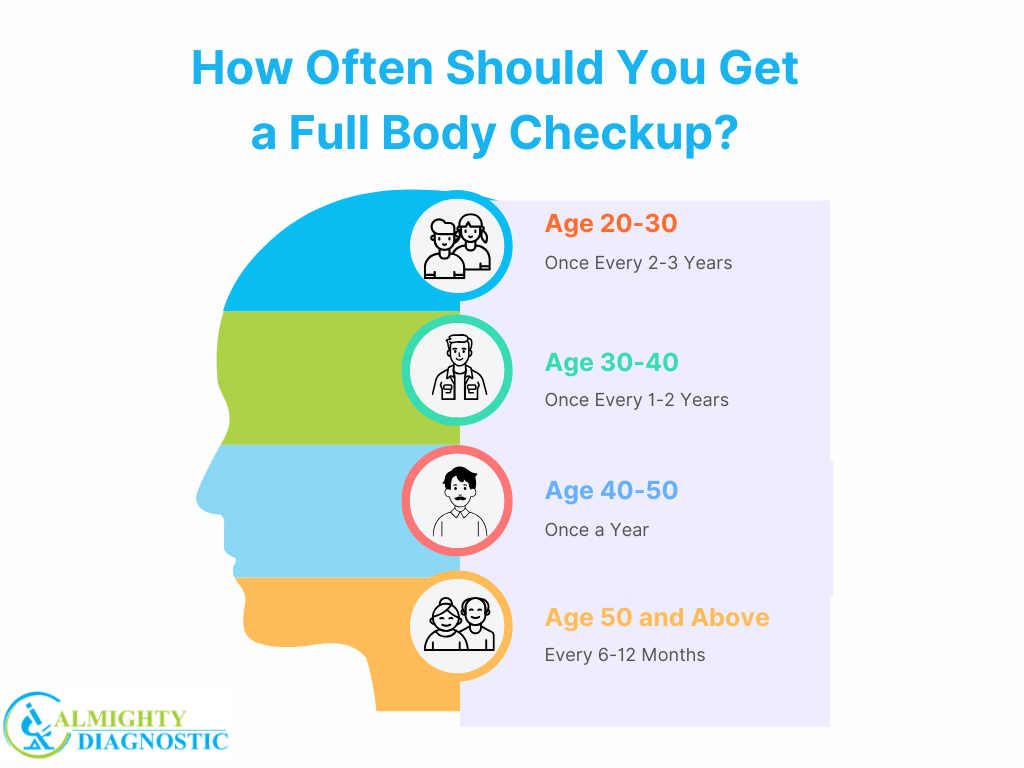As a general rule, everyone under the age of 50 should get a regular check-up done once every 3 years if they are in relatively good health. Regular health check-ups for senior citizens should be done at least once a year.
In today’s fast-paced world, health often takes a backseat until problems arise. However, preventive health checkups play a crucial role in detecting potential health risks before they become serious. But how often should you get a full body checkup? Let’s explore expert recommendations on health test frequency and the importance of Full Body Checkup.
Why Are Regular Health Checkups Important?
It’s important to have a regular health check-up because routine medical tests for adults help monitor overall health, detect early signs of diseases, and provide timely intervention. Conditions like diabetes, hypertension, and high cholesterol often develop silently, making regular checkups essential for prevention.
How Often Should You Get a Full Body Checkup?
The frequency of full body checkups depends on age, lifestyle, medical history, and risk factors. Here’s a general guideline:

1. Age 20-30: Once Every 2-3 Years
- If you’re healthy and have no existing medical conditions, a full body checkup every 2-3 years is sufficient.
- Key tests include blood pressure, cholesterol levels, and basic blood tests.
2. Age 30-40: Once Every 1-2 Years
- As metabolism slows and lifestyle diseases increase, health checkups should become more frequent.
- Recommended tests: blood sugar levels, lipid profile, liver and kidney function tests, and ECG (if required).
3. Age 40-50: Once a Year
- Regular health screening is essential to monitor risk factors for heart disease, diabetes, and cancer.
- Additional tests: thyroid function, cardiac evaluation, and cancer screenings based on gender and family history.
4. Age 50 and Above: Every 6-12 Months
- Older adults are more prone to chronic illnesses, making frequent checkups crucial.
- Tests like bone density scans, colonoscopies, and more detailed cardiac assessments may be recommended.
Key Medical Tests for Adults in a Full Body Checkup
A comprehensive preventive health checkup usually includes:
✅ Complete Blood Count (CBC)
✅ Blood Sugar (Fasting & Postprandial)
✅ Lipid Profile (Cholesterol levels)
✅ Liver & Kidney Function Tests
✅ Thyroid Function Test
✅ ECG & Chest X-ray (for heart and lung health)
✅ Cancer Screening (Pap smear, Mammogram, PSA test for men)
Frequently Asked Questions (FAQs)
1. What happens during a full body checkup?
A full body checkup typically includes blood tests, urine tests, imaging scans, and physical examinations. The doctor evaluates your overall health, identifies risk factors, and provides preventive recommendations.
2. What is the best time to get a full body checkup?
It’s best to schedule your checkup in the morning on an empty stomach for accurate blood test results. Avoid alcohol and heavy meals the night before.
3. Can I do a full body checkup at home?
Yes, many diagnostic centers offer home sample collection for blood tests. However, imaging tests like X-rays and ultrasounds require a visit to the diagnostic center.
4. Are full body checkups covered by insurance?
Some health insurance plans cover preventive checkups. Check with your insurance provider to know your coverage details.
5. What happens if my test results show abnormalities?
If any test results indicate potential health issues, your doctor will guide you on further investigations, lifestyle changes, or medical treatment.
The Bottom Line
The right health test frequency depends on your individual health needs. Consulting a doctor will help you determine the best schedule for your full body checkup. Prioritizing preventive health checkups ensures early detection and better health management in the long run.
Need a comprehensive health checkup? Book your full body checkup at Almighty Diagnostics today!

